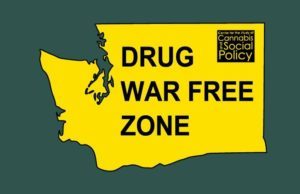by Dominic Corva, Social Science Research Director
I reprint here, with permission, the letter drafted by the only Washington State I 502 trade group whose membership is dedicated to ending the drug war as well as optimizing legal cannabis policy and markets. Full disclosure: CASP is a member of this trade group, as a drug policy scholar and expert rather than as a direct industry stakeholder, and I played a central role in the committee that drafted this letter. Alliance Executive Director Lara Kaminsky, the author of the letter, is a member of the CASP Board.
The Washington State Liquor and Cannabis Board PO Box 43080 Olympia, WA 98504 RE: Recreational Marijuana Home Grows Public Comment
The Cannabis Alliance
3233 S. Hanford St., Seattle, WA 98144
Email: info@thecannabisalliance.us
www.TheCannabisAlliance.us
October 2, 2017
Dear Board and Staff of the WSLCB, Please accept these comments as the official recommendation of The Cannabis Alliance, the state’s largest cannabis industry/advocacy group representing the largest number of licensed cannabis business owners in the state.
The Cannabis Alliance helped facilitate an internal committee of members and additional stakeholders to assist and advise us with our recommendation on recreational marijuana home grows. The board of The Alliance unanimously approved the recommendation of the committee and is submitting it here for the record. First, we would like to clearly outline the scope of work mandated by the legislation that was enacted in 2017. The legislation directs the WSLCB to “conduct a study of regulatory options for the legalization of marijuana plant possession and cultivation by recreational marijuana users.” (Emphasis added) The study must take into account the “Cole Memo,” issued by the United State Department of Justice in 2013, which outlines the federal government’s enforcement priorities in states where medical or recreational marijuana has been legalized or decriminalized.
After reviewing the directive it became clear which of the three options proposed by the WSLCB The Cannabis Alliance would support. To review the three options are:
Option 1: Tightly Regulated Recreational Marijuana Home Grows Option
2: Local Control (or regulation) of Recreational Marijuana Home Grows
Option 3. Recreational Home Grows are Prohibited (or the status quo)
The Cannabis Alliance is recommending Option #3, or the status quo. The reasons for us doing so are very important to communicate.
1. The home grow issue is a civil liberty issue. It is outside the purview of the LCB, as a regulatory agency, to license people to grow a plant on a limited scale in the privacy of their own home. The jurisdiction of the LCB is the regulation of business practices of licensed entities engaged in commercial sales, not the regulation of private citizens.
2. There is no other situation that exists, in any state that allows home grow, for the home grow to be registered with or regulated by a state agency.
3. None of the other states have run afoul of the Cole memo. The Cole memo is not supposed to be used to write legislation rather it was written to protect states rights.
We need to be clear that The Cannabis Alliance is NOT opposing home grow; and we are certainly not “opposing” home grow because our businesses feel threatened by it. Rather, we fully support home grow as a civil liberties issue, of which there was no such option presented.
We appreciate the opportunity to comment and want to reiterate our strong desire to see adults granted the ability to grow in small quantities at home. As stated by Alison Holcomb “The primary motivation for putting I-502 on the ballot was to end the criminalization of cannabis use, growing, and provision, and begin moving us in a new, public health-focused direction. Prohibiting adults from cultivating their own cannabis for personal use is inconsistent with that overarching goal.”
We are committed to continued collaboration and are happy to answer any questions.
Sincerely, Lara Kaminsky Executive Director The Cannabis Alliance

Sweet! The atrocious oversight by the LCB of Cannabis testing labs and their seeming reluctance to inhibit “bad” (where “bad” includes untested, failed, tested by a non-certified lab and tainted ) product from being available on store shelves reinforces the NEED for homegrow.
If nothing else, the LCB’s poor prioritization of consumer safety & health, reinforces Ms. Holcomb’s statement that civil liberties homegrow is consistent with both the intent of I-502 and the goals if the 2nd Cole memorandum.